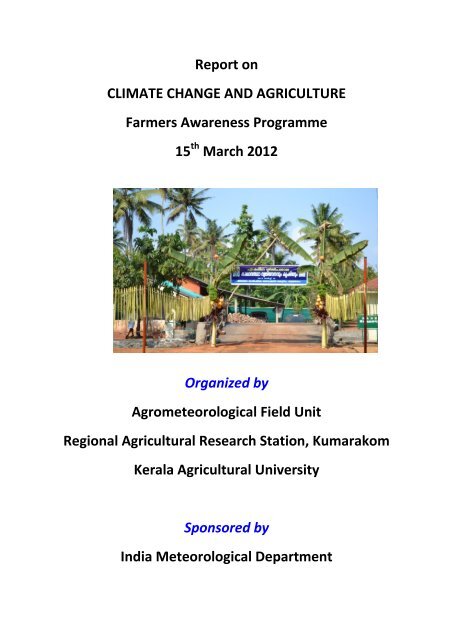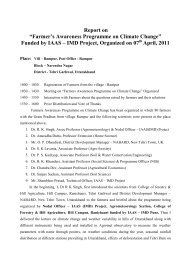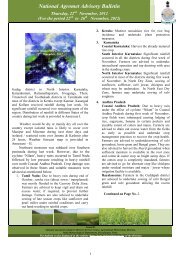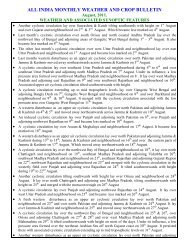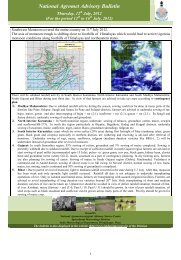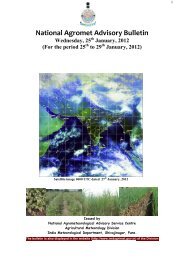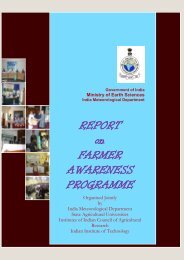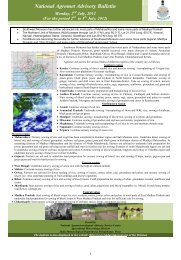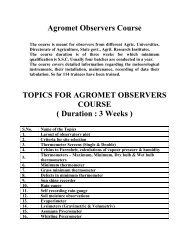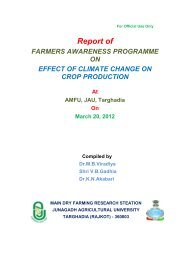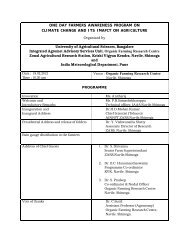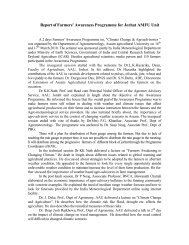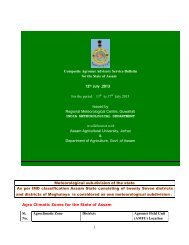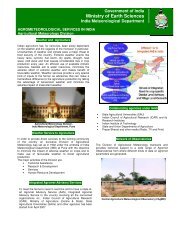AMFU Kumarakom -Report on Farmer awareness programme .pdf
AMFU Kumarakom -Report on Farmer awareness programme .pdf
AMFU Kumarakom -Report on Farmer awareness programme .pdf
You also want an ePaper? Increase the reach of your titles
YUMPU automatically turns print PDFs into web optimized ePapers that Google loves.
<str<strong>on</strong>g>Report</str<strong>on</strong>g> <strong>on</strong><br />
CLIMATE CHANGE AND AGRICULTURE<br />
<strong>Farmer</strong>s Awareness Programme<br />
15 th March 2012<br />
Organized by<br />
Agrometeorological Field Unit<br />
Regi<strong>on</strong>al Agricultural Research Stati<strong>on</strong>, <str<strong>on</strong>g>Kumarakom</str<strong>on</strong>g><br />
Kerala Agricultural University<br />
Sp<strong>on</strong>sored by<br />
India Meteorological Department
A One day workshop <strong>on</strong> “Climate change and Agriculture” was organized in RARS<br />
<str<strong>on</strong>g>Kumarakom</str<strong>on</strong>g> as part of the farmer <strong>awareness</strong> <strong>programme</strong> under Integrated Agromet Advisory<br />
Services Project <strong>on</strong> 15 th March 2012. Over 120 delegates comprising 83 farmers. official of<br />
the development department, scientists, researchers and technical pers<strong>on</strong>nel and media<br />
representatives participated. Climatic variability and agriculture, impacts of climate change<br />
<strong>on</strong> animal husbandry, impacts of climate change <strong>on</strong> fisheries, role IT sector in informati<strong>on</strong> e<br />
disseminati<strong>on</strong> especially weather wise crop informati<strong>on</strong> and Integrated Agromet advisory<br />
services to the farmers were discussed in various sessi<strong>on</strong>s. A visit to Agromet observatory<br />
was also arranged as part of the program.<br />
Dr. G.S.L.H.V. Prasada Rao (Associate Director, KAU), Dr. A. Jalaludeen, Director of<br />
Academics and Research, KVASU, Dr. K.G. Padmakumar, Associate Director, RARS<br />
<str<strong>on</strong>g>Kumarakom</str<strong>on</strong>g> served as resource pers<strong>on</strong>s in different sessi<strong>on</strong>s.<br />
The workshop started with welcome address of Dr. K.G. Padmakumar, Associate Director,<br />
RARS <str<strong>on</strong>g>Kumarakom</str<strong>on</strong>g> by 10: AM, Dr. K.R. Viswambharan, IAS, vice Chancellor, Kerala<br />
Agricultural university presided over the functi<strong>on</strong>. Dr. V.S. Vijayan, Chairman (Rtd.) Kerala<br />
state Biodiversity board inaugurated the functi<strong>on</strong>. Father Thomas Peeliyanikkal, Executive<br />
Director,Kuttanad development society , Dr. Koshalya Ramachandran, Principal Scientist,<br />
CRIDA, Hyderabad were the special guests. The following pers<strong>on</strong>s made felicitati<strong>on</strong> address<br />
Smt. Dhanya Sabu, Grama Panchayat president, <str<strong>on</strong>g>Kumarakom</str<strong>on</strong>g>, Smt. Valsamma Thankappan<br />
Member, <str<strong>on</strong>g>Kumarakom</str<strong>on</strong>g> Grama Panchayat. Sri. A.P. Gopi, Member, <str<strong>on</strong>g>Kumarakom</str<strong>on</strong>g> Grama
Panchayat, Sri. V.K. Raju, Principal Agricultural officer, Kottayam. The inaugural sessi<strong>on</strong><br />
was adjourned with vote of thank by Sri. Shajeesh Jan, P, Assistant professor(Agromet).<br />
Dr. Dr. K.R. Viswambharan, IAS, H<strong>on</strong>. Vice Chancellor, Kerala Agricultural University, in his<br />
presidential address stressed that climate change is real and the situati<strong>on</strong> will become worse<br />
in this century. Although climate change is a global phenomen<strong>on</strong>, negative impacts are most<br />
severely felt by the poor people in developing countries that lack resources, knowledge<br />
capability due to poor research infrastructure. The most vulnerable people are the farmers<br />
who depend <strong>on</strong> natural resources for their livelihood. The rural populati<strong>on</strong> who depend<br />
heavily <strong>on</strong> agriculture, livestock keeping or fishing etc. are the most climate sensitive<br />
sectors. He explained in details the various <strong>programme</strong>s to combat climate which is being<br />
taken up by the university and <strong>programme</strong>s which are undergoing in this scenario. Looking<br />
at the importance of climate change Educati<strong>on</strong> and research, he said that the KAU has<br />
already started an “ Academy of Climate Change Educati<strong>on</strong> and Research” , first of its kind<br />
in the country . He also appreciated the efforts for interactive projects viz., Agromet advisory<br />
service started at <str<strong>on</strong>g>Kumarakom</str<strong>on</strong>g> centre with the financial assistance of India meteorological<br />
department under Ministry of Earth sciences, Government of India.
Dr. V.S. Vijayan, Chairman(Rtd.) Kerala state Biodiversity board and renowned ecologists<br />
in his inaugural speech elaborated the essential need for evolving ‘green practices’ that<br />
reduce emissi<strong>on</strong> of gases by changing our farming practices and also the importance of<br />
organic farming and emphasized emergency of reducing the use of chemical fertilizer and<br />
pesticide. He explained that by resorting to organic farming practices we can combat the<br />
issue of GH gas emissi<strong>on</strong> and adverse effects of climate change.<br />
Dr. A. Jalaludeen, Director of Academics and Research, Kerala Veterinary and Animal<br />
Sciences University (KVASU) highlighted the impact of climate change and climate variability<br />
<strong>on</strong> poultry and animal husbandry sector. He emphasized that the proposed high temperature<br />
will adversely affect the sector and which may result in reduced food intake by the animals<br />
and birds and ultimately resulted in reduced meat and egg producti<strong>on</strong>. Scarcity of water and<br />
increased frequencies of drought, floods, Storms etc. will lead to destructi<strong>on</strong> of resources.<br />
He also pointed out that that these adverse effects will also result in incidence of new<br />
diseases and the effect is going to be the highest in India which sustain maximum cattle<br />
populati<strong>on</strong> globally which is around 560 milli<strong>on</strong>s. Nevertheless, in India studies <strong>on</strong> impact of<br />
climate change <strong>on</strong> Animals and poultry is scarce.<br />
Father Thomas Peeliyanikkal, Executive Director ,Kuttanad Development Society called for<br />
introducing weather based crop insurance scheme which has not been implemented in<br />
Kerala and also demanded for introducing weather based crop calendar to the Kuttanad as<br />
proposed by the Dr. MS Swaminathan Commissi<strong>on</strong>.
Dr. GSLHV. Prasada Rao explained the impact of climate change and climate variability <strong>on</strong><br />
Agricultural crops. He explained the c<strong>on</strong>cepts and difference between climate change and<br />
climate variability. He also elaborated the effect of climate variability <strong>on</strong> plantati<strong>on</strong> crops, rice<br />
and spices and also explained the mitigative strategies to combat climate change. He also<br />
told that there will be increase of 3 °C rise in average temperature in India and which will<br />
adversely affect the food security of the country and predicted steep price rice in essential<br />
food commodities.<br />
Dr. Koshalya Ramachandran, Principal scientist, CRIDA mooted that the adverse affect <strong>on</strong><br />
climate change will lead to biodiversity shrinkage which in turn affect the existence of the<br />
very life in the earth.<br />
Mr. Mahesh, Nokia India Ltd. invited speaker from IT industry explained the efforts by Nokia<br />
in Weather based agro advisory services and explained the advantages of the Nokia<br />
applicati<strong>on</strong> software “Nokia life tool” and clarified the doubts of farmers in this regard.<br />
Dr. K.G Padmakumar, Associate director, RARS <str<strong>on</strong>g>Kumarakom</str<strong>on</strong>g> explained in details <strong>on</strong> impact<br />
of climate change <strong>on</strong> fisheries sector and pointed out that the effect of climate change will be<br />
more pr<strong>on</strong>ounced in the Kuttanad area and emphasized that the there was an increase of<br />
around 3°C mean annual maximal temperature at <str<strong>on</strong>g>Kumarakom</str<strong>on</strong>g> observatory during the last 3<br />
decades. Climate change is likely to impede sustainability of our capture fisheries which is<br />
even now under great pressure due to over exploitati<strong>on</strong> and envir<strong>on</strong>mental decline. More<br />
frequent weather events in the changed scenario will affect producti<strong>on</strong> not <strong>on</strong>ly in agriculture<br />
but also in aquaculture. The growth of aquaculture which was unprecedented in the past
three decades. With increased pressure <strong>on</strong> captive fishes and there will be attempts for<br />
unsustainable developments in aquaculture that might lead to detrimental practices that<br />
aggravate warming related problems.<br />
Mr. Shajeesh Jan, P, Assistant professor (Agromet) explained about the Integrated Agromet<br />
advisory service rendered under the <str<strong>on</strong>g>AMFU</str<strong>on</strong>g> <str<strong>on</strong>g>Kumarakom</str<strong>on</strong>g> and gave details <strong>on</strong> different<br />
weather forecasting services in India, Preparati<strong>on</strong> of Agromet advisory services and<br />
disseminati<strong>on</strong> of the bulletins in different methods and also discussed about ways to improve<br />
the disseminati<strong>on</strong>. The biweekly weather based advisory bulletins is issued <strong>on</strong> every<br />
Tuesdays and Fridays from this stati<strong>on</strong>. These bulletins c<strong>on</strong>tains advisories for all the<br />
weather sensitive agricultural operati<strong>on</strong>s from sowing to harvest. It enables farmers to take<br />
advantage of benevolent weather and minimise the adverse impact of malevolent weather<br />
<strong>on</strong> crops. These weather based advisories are disseminated to the farmers through<br />
multichannel disseminati<strong>on</strong> system such as mass media disseminati<strong>on</strong>, internet etc as well<br />
as through district level intermediaries and through selected farmers of the district.<br />
Five raingauges were distributed to the following farmers and which have been installed<br />
properly<br />
1. Sasidhara Sharma V<br />
Thekkedath , Thalayazham (PO).,<br />
Vaikom, Kottayam<br />
2. Joy koloth<br />
Ideyanal (PO).,<br />
Ramapuram, Kottayam<br />
3. P.T Abraham<br />
Pallathadam<br />
Athirampuzha (PO).Kottayam<br />
4. Mohan Kottakkal<br />
Parippu (PO)., Kottayam<br />
5. Mohanan Kartha<br />
Kizhakedath house<br />
Mevada(PO).,<br />
Pala,Kottayam
A very active discussi<strong>on</strong> sessi<strong>on</strong> followed the seminar with participants and resource<br />
pers<strong>on</strong>s <strong>on</strong> various issues. The farmers shared the feeling that indigenous knowledge <strong>on</strong><br />
weather forecasting shall also be c<strong>on</strong>sidered for integrated analysis if climatic events. The<br />
questi<strong>on</strong>s <strong>on</strong> relati<strong>on</strong>ship between pest and disease outbreak especially <strong>on</strong> rice and<br />
vegetables due to climate change was also raised. Dr. GSLHV Prasada Rao explained the<br />
role of critical weather elements and how the change of each of them will influence the<br />
populati<strong>on</strong> buildup and spread of pest and diseases. He also explained the need for<br />
devloping crop- weather calendar in Kuttanad, which is an endemic regi<strong>on</strong> for most pests<br />
and diseases. Specific questi<strong>on</strong>s were asked <strong>on</strong> the animal husbandry practices to mitigate<br />
high summer temperature situati<strong>on</strong>s, since milk producti<strong>on</strong> was observed to be drastically<br />
reduced due to high temperature this seas<strong>on</strong>. Dr. A. Jalaludeen, explained in detail the<br />
various measures that can be adopted in this regard.
The participants visited the Agromet observatory of this stati<strong>on</strong> and familiarised with the<br />
various weather recording instruments and were given hands <strong>on</strong> experience in instrument<br />
reading and data recording. The <strong>programme</strong> came to close at 5: 00 PM<br />
A fund of Rs. 35,000/- was provided by India Meteorological Department, New Delhi ,<br />
Ministry of Earth Sciences, Govt. of India for the c<strong>on</strong>duct of <strong>programme</strong> and the total<br />
expenditure was Rs 35357.<br />
The <strong>programme</strong> and workshop proceedings were widely covered by print media, AIR and<br />
various visual media


